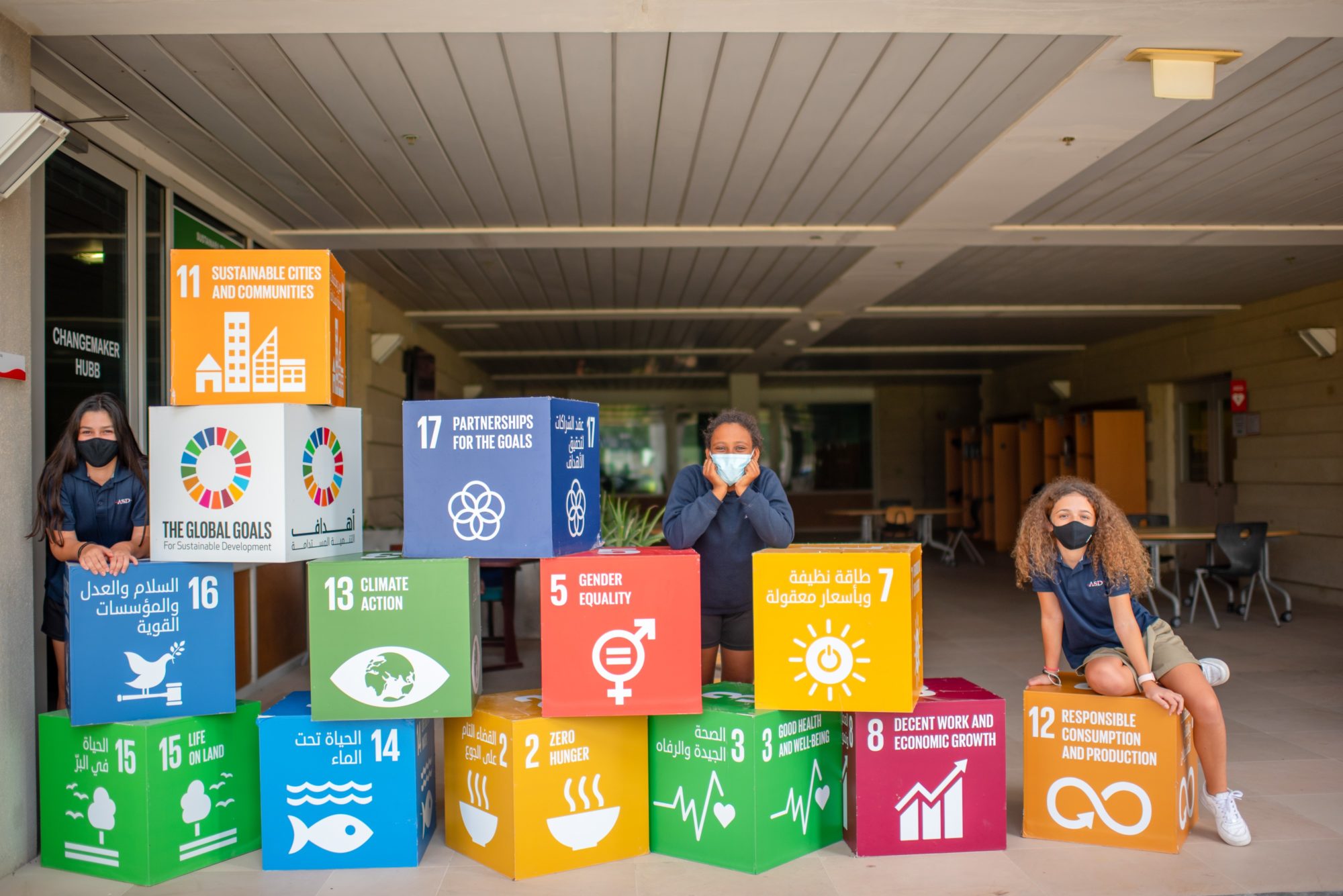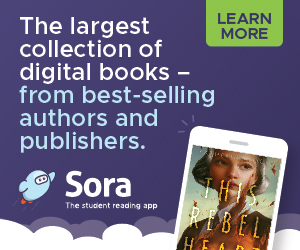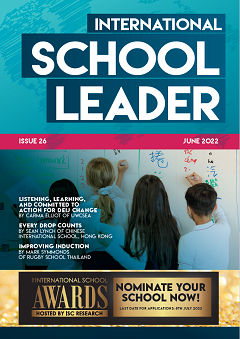By Laurence Myers
In an increasingly (and some might say over) globalised world, schools often utilise terms such as ‘global citizenship’, ‘sustainability’ or ‘service learning’ to describe a set of conditions aimed at making the world a better place through student work.
The concept itself can be nebulous and different schools will call ‘it’ different things. The schools that stand out in generating educational conditions for success in global citizenship, service learning and/or sustainability are the ones that are best able to put their finger on ‘it’ (define what they are talking about), support ‘it’ (through resources and guiding principles/policies), nurture ‘it’ (with flexibility) and recognise that ‘it’ is not simply an outcome, but constantly evolving learning.
They also cultivate the capacity in students to see themselves not merely as learners, but as contributors to the wellbeing of the world community. American School of Dubai (ASD) strives to be such a school, in part through its change-maker education programme.
Putting a finger on ‘it’
Back in 2011, when ASD moved into its new, university-like, purpose-built campus, it began with a community-wide commitment to a mission that highlights individualised learning, passions and skill-building to contribute to a rapidly changing world. Part and parcel of this commitment was defining our ‘it’, particularly with regard to contribution. We have defined service learning (classroom-based learning including action), global citizenship (skill-building for action) and sustainability (innovation to rebalance the world, now).
The compounded benefit of these definitions is a recognition that we value critical consciousness (ie, our actions have implications on the world around us, and that we are responsible for generating change), informed action (ie, the imperative for action) and the authenticity of learning (ie, students engaging in non-predetermined learning that may or may not lead to a successful outcome), all ideally placed inside the classroom.
On a practical level, this allows us to create strategic plans, indicators of success and action plans to reach a level of adoption that, essentially, equates to a school ethos – a lofty goal, really.
Supporting ‘it’
To support this ethos of contribution, we needed a champion, a thought leader and a guide. In 2014, the school established the first K-12 service learning coordinator who spent two years laying the groundwork for service learning, developing programmes, procedures, budgets and staffing. By 2016, it was clear that ASD was well on its way to ensuring that its student community had opportunities – both inside and outside the classroom – to be contributors in ways that had previously been confined to the more typical bake sales and raffles that continue to exist the world over.
Simultaneously, and after a process of data collection and analysis, there was evidence to support the establishment of a garden coordinator position as well who has, over the past six years, developed an edible education programme that includes a sustainable garden, an apiary (bee garden), a classroom kitchen and composting programmes.
In 2019, ASD partnered with the JUMP! Foundation to catalyse global citizenship, a term that currently figures prominently in our student profile, along with the other attributes: empathy, innovation, resilience, self-awareness and communication. For a little over a year, a JUMP! staff member shared our office space and helped to envision an ASD contributor’s skill set.
Nurturing ‘it’
It was only a matter of time before the conversations flowing from the three elements – global citizenship, service learning and sustainability – led to the need for a common connection. To identify what is, truly, that one thing that our ‘it’ is all about. Several collaborative and critical sessions led to the identification that the heart of it all was the change agency of our students: and change-maker education was born.
So here we stand. Our ‘why’ is simply a world in balance. A world we can proudly share and, one day, bequeath to our children, filled with life and wonder. Our ‘what’ is global citizenship; specifically we see ASD students as globally aware and ethical, embracing the natural world and human diversity. They are contributors to positive change through sustainable, informed action. Finally our ‘how’ is service learning; a learning methodology, integrated in curriculum, blending inquiry and informed action to promote positive change, contribute to social transformation and develop critical consciousness.
Two years ago we moved into the change-maker hub, a small, dedicated collaborative space where everyone is welcome. In this space, students, educators, parents and visitors alike are found sharing ideas, thinking about ‘what if’ or asking, ‘what next?’. It’s where concepts become plans, which then become action.
Our on-the-ground change-maker education is dynamic and hybrid in nature. We collaborate with teachers on unit development. We work with administration on best practices. We recommend policies, and calibrate our work in support of our strategic plans. We work with the facilities department to identify leverage points for sustainable change. We work with students to provide them with knowledge, skills, context and opportunities to address issues that are important to them, with authentic results – including the learning opportunity of failure. We work with external partners to develop joint programming. We work with parents to engage in community-wide conversations.
We cannot, of course, be everywhere at once, so it’s even more important that we build capacity and empower stakeholders to make their own personal and collective change toward a better world.
Bearing witness to ‘it’
Perhaps the most obvious evidence that our journey is successful is the discovery that ‘it’ is happening all over the place. It’s in the use of the sustainable development goals in a joint language arts and science project, and in teachers using systems thinking to connect to social justice, and in our self-directed project (a course without pre-existing content) being described as a “game-changer”. It’s our facilities office inviting students to help vet vendors’ proposals for solar solutions in support of our sustainability goals.
We don’t have all the answers. We have learned much from mistakes and misses. But with the right frame of mind (innovative and ever-learning) and with the benefit of commitment over time, schools can get much closer to reaching their mission.
All aboard!
How can this story apply to your school?
- Find a direction (you might already have one) that allows your students to see themselves not simply as learners but as constructors of the future.
- A full-time director can take you far! It takes time to ideate, create and nourish a programme that cultivates contributing, sustainable, service-minded global citizens.
- If ever the ‘how’ gets in the way of the ‘why’, take the time to reflect, recommit and rethink your purpose as communities of learning.
- Celebrate the little things – and the big ones!
- Stay the course, but be flexible in getting there.
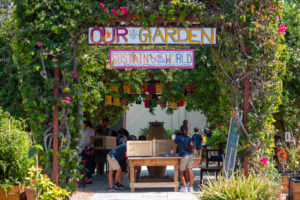
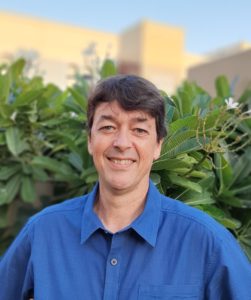 Laurence Myers is Service Learning Coordinator at American School of Dubai, UAE. Connect directly with Laurence on LinkedIn.
Laurence Myers is Service Learning Coordinator at American School of Dubai, UAE. Connect directly with Laurence on LinkedIn.
